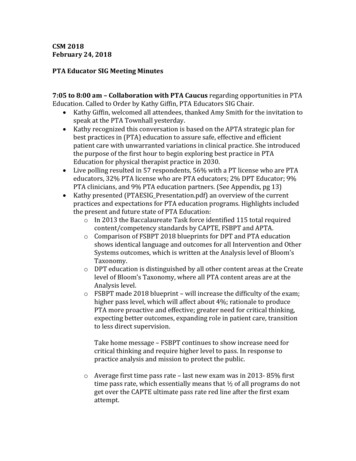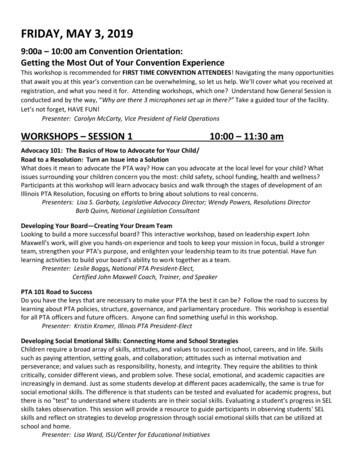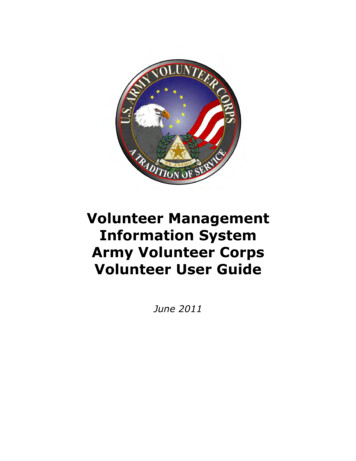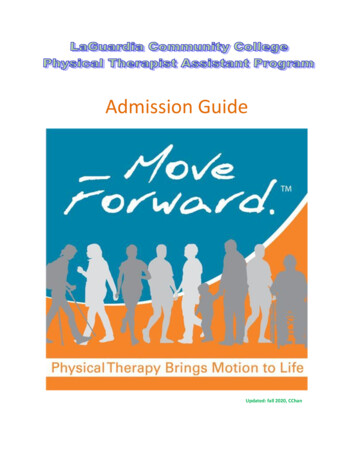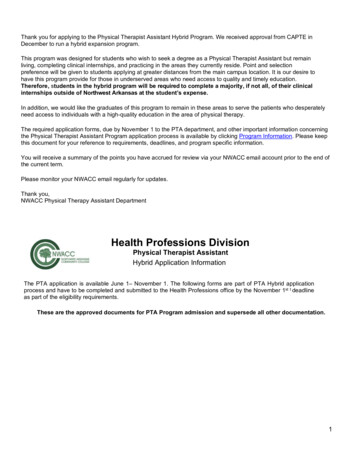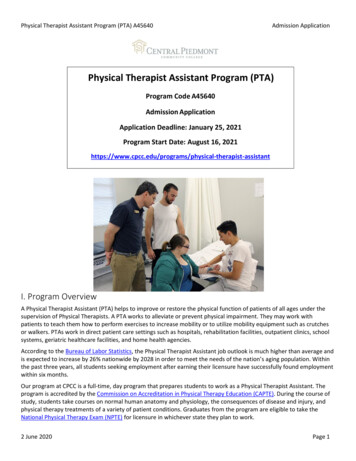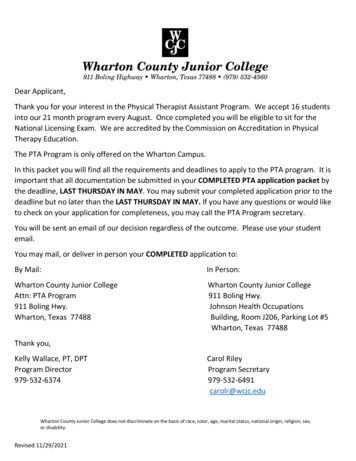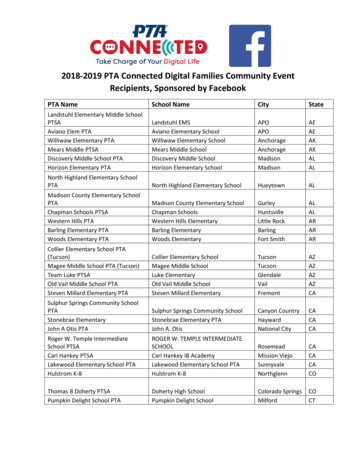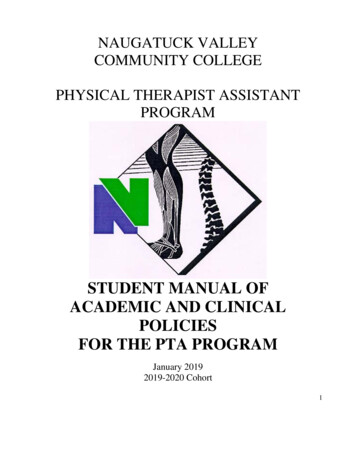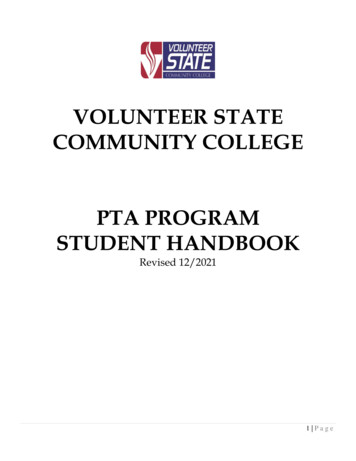
Transcription
VOLUNTEER STATECOMMUNITY COLLEGEPTA PROGRAMSTUDENT HANDBOOKRevised 12/20211 Page
Table of ContentsWelcome . .4Program Accreditation 4PTA Program Mission, Philosophy and Description .5Program Outcomes .5Admission and Appeals Process 6Admission Status .6Appeals Process (Screening and Selection) .6Conduct and Professionalism . .7Dress Code . .7Participation Policy. . .8Excused Absences . .8Tardiness 8Notification of Absence or Tardiness 8Excused Absence / Tardiness Form .8Consequences of Absenteeism or Tardiness (Counseling or Probation) . 8Consequences of Absenteeism or Tardiness (Lowering of Grade) 8Consequences of Absenteeism or Tardiness (Dismissal from the Program) 9Clinical Participation . .9Notification of Absence / Tardiness during a Clinical Rotation 9Inclement Weather 9Outside Activities / Guest Lectures .10Medical Release .10Internet / Email Policy .10Required Documents .10Medical Documentation .10Professional Liability Insurance 11CPR Certification .11Laboratory and Classroom Policies .12Cell Phones .12Safety Regulations in the Classroom and Lab .12HIPAA and Bloodborne Pathogen .12Equipment 12Laboratory/Classroom Computer Use Policy 13Laboratory Class Practice .13Accommodations for Religious Beliefs 14College Policy Statement 14Grading Policies .17Grading and Evaluation of Student Performance .17Grading Scale .18Student Grievance Policy Regarding Grade Change .18Deadlines .19Clinical Education .19Clinical Learning Experiences .19Assessing and Documenting Student Progress in the Clinical Setting .19Grading Criteria for Clinical Education .20Plans for Remediation .202
Students in Jeopardy .20Clinical Site Grievance 20Confidentiality .21Disciplinary Offenses .21Graduation .22Employment Opportunities .22Employer’s Day .22Job Placement as a Graduate PTA 22Licensure .23Remediation following Graduation .23Class Officers 23Student Conferences .24Professional Associations . 24Costs: Miscellaneous .24Housekeeping Duties .25Smoking / Smokeless Tobacco .25Accidents .26Library .26Copier 26Withdrawals / Dismissal .26Withdrawals .26Dismissal .26Appeals Process for Readmission .28Schedule 28Disability Statement 28Due Process/Complaints .29PTA Program Calendar 2022-2023 29Appendix A – Code of Ethics for the Physical Therapist .30Appendix B – Standards of Ethical Conduct for the PTA .33Appendix C – Professional Development Skill Rating .35Receipt and Acceptance of Responsibility .373
WelcomeWelcome to Volunteer State Community College, Physical Therapist Assistant Program! We congratulate youon your decision to continue your education and trust that this decision will enrich your life and expand yourfuture. This Program integrates classroom and clinical teaching to qualify the graduate as a skilled mid-leveltechnical health care worker in the Physical Therapy profession. The students and faculty are charged to worktogether to achieve the Program goals and, therefore, to contribute to the growth and advancement of theprofession. This Handbook will give you a sense of the College and Department to ensure that you haveimportant information to guide you to success in your academic endeavors. Read it carefully and keep itavailable for future reference. The faculty and staff of the Department wish you the best of luck during yourtime at Volunteer State. We will be happy to answer your questions. Feel free to call on us when we can help.This Handbook represents the policies and procedures, curriculum and philosophy of the faculty of theDepartment of Physical Therapy. Thank you to the faculty, students and staff who have provided informationand direction in the development of this handbook.Revised and approved by PTA faculty December 2020.Program AccreditationVolunteer State Community College is accredited by the Commission of Colleges of the Southern Association ofColleges and Schools (1866 Southern Lane, Decatur, GA 30033-4097, telephone 404-679-4501) to award theAssociate Degree.The Physical Therapist Assistant Program is accredited by the Commission on Accreditation in Physical TherapyEducation of the American Physical Therapy Association (111 North Fairfax Street, Alexandria, VA. 22314,telephone 800-999-2782).The Physical Therapist Assistant (PTA) Program Director will submit all required accreditation fees anddocumentation, including reports of graduation rates, performance on state licensing examinations, andemployment rates in a timely manner. The PTA Program Director will also notify the Commission onAccreditation in Physical Therapy Education (CAPTE) of expected or unexpected substantive change(s) withinthe program, and of any change in institutional accreditation status or legal authority to provide postsecondary education in a timely manner.The PTA Program Director will be responsible for the program meeting compliance with accreditation criteriawithin two years of any cited deficiencies.The Program Director is responsible for the maintenance of accurate information on the Program’s websiteincluding, but not limited to, accreditation statement and status of the Program, CAPTE logo and currentstudent outcomes.The faculty and students of the PTA Program abide by the following statement:"Volunteer State Community College, a Tennessee Board of Regents institution, is an equal opportunityinstitution and ensures equal opportunity for all persons without regard to race, color, religion, sex, nationalorigin, age, disability, political affiliation, sexual orientation or status as a qualified veteran with a disability orveteran of the Vietnam era."4
PTA Program, Mission, Philosophy and GoalsMission: The Physical Therapist Assistant Program offers an Associate Degree and seeks to graduate individualswho are competent and qualified to assume roles in the health care field as Physical Therapist Assistants. Theprogram is committed to excellence in serving the ever-changing needs and interests of the Physical Therapycommunity of Middle Tennessee. The program supports the practice of Physical Therapy as a vocation tostrengthen the healthcare workforce and economic development of Middle Tennessee.Philosophy: The philosophy of the Physical Therapist Assistant Program supports and assists theimplementation of the philosophy and purposes of Volunteer State Community College. In support of theCollege’s mission statement, the Program believes education is a partnership with the Physical Therapycommunity to enhance student learning. The faculty encourages the development of the individual throughoptimum learning experiences in the classroom and clinical settings. The Program and the Physical Therapycommunity provide rich learning experiences and resources that enable students to develop competenciesnecessary for practice as a Physical Therapist Assistant.Program Description:Physical therapist assistant (PTA) programs in Tennessee’s state community college system are accredited twoyear associate degree programs that prepare graduates to perform selected components of patient treatmentand assessment under the direction and supervision of the physical therapist in an ethical, legal, safe, andeffective manner. These PTA programs combine general education courses, physical therapy lecture andlaboratory courses, and clinical education to produce competent, caring, quality oriented physical therapistassistants who are prepared for taking the National Physical Therapy Examination (NPTE) and for enteringthe field of physical therapy with the required knowledge, skills, and behaviors of an entry-level PTA.Program OutcomesPhysical Therapist Assistant Graduates of Tennessee's state community college system will:1. Support the diverse physical therapy healthcare needs of Tennessee communities through employmentas physical therapist assistants working under the supervision of physical therapists.a. 90% of graduates will be employed in a variety of physical therapy settings within one yearof passing the licensure exam2. Demonstrate entry-level competence as physical therapist assistants as evidenced by successfulcompletion of the National Physical Therapy Examination (NPTE) and qualification for state licensure.a. National licensure ultimate pass rate for the Program is at least 85% over a 2 year average3. Identify career development and lifelong learning opportunities as physical therapist assistants incontemporary physical therapy practice.a. Students/graduates who participate in continuing education will indicate theyattend continuing education courses at least once per year.b. The program requires 100% student membership in the APTA5
Admission and Appeals ProcessADMISSION STATUSClass size is limited to 24 seats, therefore students are admitted to the technical year of the PTA Program withone of three Admission Statuses:Admission: The student has met all admission requirements, including pre-requisite course work, witha grade of “C” or better (ENGL 1010, AHC 101, PSYC 1030 & Fine Arts), a grade of B or higher is requiredin the Math and Sciences (Math 1130 or Math 1710, BIOL 2010, BIOL 2020, AHC 1100 and AHC 115) andhas submitted all necessary documentation. It is required that the student must complete all 27 hours ofprerequisite courses required for the Associate of Applied Science Degree in the Physical TherapistAssistant curriculum. A grade of B or higher is required in the Math and Sciences (Math 1130 or Math1710, BIOL 2010, BIOL 2020, AHC 1100 and AHC 115) to be considered for the program. Please also notethat there are physical requirements needed for successful clinical practice and entry to the workforce.See belowPHYSICAL DEMANDS NEEDED FOR SAFE PRACTICELifting 50 pounds with frequent lifting and carrying of objects weighing up to 25 pounds is aminimum requirement for working in a PT department. Walking, standing, bending, stooping andsitting for prolonged periods are also required. Full use of gross and fine motor skills of the upperand lower extremities is a requirement for safely performing the job duties of a PTAThe above skills are considered to be the minimum physical requirements needed in order tosafeguard a patient while under the care of a PT or PTA.Conditional: At the time of admission, the student lacks documentation. At the time of admission, thestudent will be advised of the conditions of admission through the admission letter and forms.Continuation in the program is subject to meeting specified conditions. NOTE: For all admission yearsafter 2006, all admissions are conditional until the successful completion of a student background check.Alternate: In the event any student declines admissions.APPEALS PROCESS (SCREENING AND SELECTION)The appeal process by a student is as follows:A.An applicant should submit, in written form, a statement regarding his desire for an appeal to theSelection Committee’s decision regarding his status within a program. This statement should beforwarded to the Dean of Allied Health; copies will be forwarded to the chairperson of the SelectionCommittee, the Program Director, the academic advisor (if different from the Program Director). Thisappeal MUST be submitted within ten days of receipt of the letter denying admission.B.Within one week of receipt of above, a written response will be forwarded to the student from the Deanof Allied Health.C.If the student wishes to continue the appeal, the student should submit written documentation to theVice President of Academic Affairs. All appeals should be made in writing and should include allpertinent information as appropriate to the appeals process.6
Conduct and ProfessionalismEvery PTA student is a representative of VSCC and is responsible for following the VSCC Student Handbook.Each student is also to work within the Tennessee Board of Physical Therapy’s State Practice Act. All studentsare held accountable to the APTA’s Standards of Ethical Conduct of the Physical Therapist Assistant. Thisdocument may be found in Appendix B of the PTA Student Handbook. Students enrolled in the PTA Programare expected to maintain a high standard of professionalism at all times in the classroom, lab, and clinical.Students will be evaluated using the Professional Development Skill Rating in Appendix C.Classroom courtesy is to be evident at all times and includes: respect for the Instructor and fellow classmates,the avoidance of student-to-student conversations during lecture and the avoidance of disturbing activities. Itis vital to be supportive of fellow classmates and encourage class participation. Negative behaviors directed atthe Instructors or fellow students will not be tolerated. Students may be excluded from class for exhibitingbehavior which interferes with the educational process. An Instructor may remove a student from class or labfor disruptive behavior. Students who are removed from class will sacrifice all work done after their departure.If disruptive behavior causes a student to be removed from class more than once, disciplinary action, includingpossible removal from the Program, will be initiated. All students have the right to learn in a positive andcontrolled environment without disruptions.ACADEMIC DISHONESTYPlagiarism, cheating, and other forms of dishonesty are prohibited. Students who are guilty of academicmisconduct, either directly or indirectly, through participation or assistance, are immediately responsible to theInstructor of the class. In addition to other possible disciplinary sanctions which may be imposed perrecommendations of a specially called Advisory Committee meeting, the Instructor retains the authority toassign an “F” or a zero (0) for the exercise, exam or entire course. Cheating includes but is not limited to: Plagiarism Copying off someone else’s examination/test Cueing of a classmate during examinations, including laboratory testing Obtaining copies of exams without Instructor’s permission Using unauthorized data, notes or equipment (including programmable calculators) during anexamination. Copying assignments from a classmate Knowingly and intentionally assisting another student in any of the aboveDress CodeDress code for classes is as follows: When the program invites a guest speaker, students are expected to bedressed in business casual attire: If you are uncertain of attire, discuss it with a faculty member BEFORE wearingit to class. During lab, lab clothes are to be worn in place of business casual. During labs, you will wear your labclothes for all courses with labs. Lab clothes may be requested at other times by faculty members. All clothesmust be clean, neat, and fit well. No exceptions. When students are in contact with professionals outside of thePTA faculty, (guest speakers, employer’s day etc.), students are expected to dress professionally. This policyhelps to prepare you to be professional in your clinical settings. We have lockers for your books and lab clothes,so be prepared at all times. Any disregard of the dress code will result in student being sent home to change,forfeiting class for that period of time.7
Participation PolicyA sound base of knowledge, competencies, and skills are required for effective patient care. A student in thePTA program is here for the purpose of preparing himself/herself to assume a responsible role as an Entry-levelPTA. Being absent from class decreases a student’s ability to learn the skills necessary to graduate as an Entrylevel PTA and pass the State Board Examination. Essentially, the PTA Program is the student’s first employmentopportunity as a PTA, and it should treat it as such.Students in this program are required to participate in all lectures, labs and seminars. When a student is absentfrom class it affects not only their ability to learn and practice new skills; it also affects their lab partner’s abilityto learn and practice new skills. PLEASE READ THE FOLLOWING POLICIES CAREFULLY TO ENSURETHOROUGH UNDERSTANDING.EXCUSED ABSENCESThe only acceptable reasons for absence from class are sickness or a documented family emergency. Absence forany other reason will be considered unexcused and the student will not be allowed to make up the assignmentsthat were missed. Any student who is absent from class for two or more consecutive class days must bring in adoctor’s excuse or documentation of a family emergency. Every effort should be made to participate in allscheduled classes, labs and seminars.TARDINESSTardiness is disruptive to the entire class and will not be tolerated. Every student is expected to arrive on time,be in their seat, quiet and ready to begin class at the time that the class is scheduled to start. Students are expectedto return from breaks on time and stay for the full class period. If the class is a lab class, the student will bedressed in their lab clothes and ready to begin at the time that the lab is scheduled to start. Being routinely tardyor absent is indicative of a problem that might carry over to employment. Potential employers use participationand punctuality as two indicators of dependability and employability.NOTIFICATION OF ABSENCE OR TARDINESSAll classroom absences or tardiness MUST be reported to the PTA program prior to the designated class time(phone 615-230-3332 or 615-230-3336). This policy holds true for each day absent or tardy.EXCUSED ABSENCE / TARDINESS FORMIf a student is absent or tardy, it is their responsibility to obtain an excused absence / tardy form, fill it out andreturn it to the Instructor along with any supporting documentation of the reason for the absence / tardiness.The absence / tardiness will be considered unexcused until this is done. A tardy student will be considered absent(unexcused) until the tardy form has been submitted to the Instructor. No assignments will be accepted until the absent /tardy form has been submitted.CONSEQUENCES OF ABSENTEEISM OR TARDINESS (COUNSELING OR PROBATION)Students who have more than one excused absence/tardy per semester, or a single unexcused absence/tardy,may be counseled and placed on a probationary status at the discretion of the Program Director or AcademicCoordinator of Clinical Education (ACCE). Students who are placed on probation will be given clearly definedexpectations of behavior and penalties for failure to comply with the expected behaviors.CONSEQUENCES OF ABSENTEEISM OR TARDINESS (LOWERING OF GRADE)In addition, having more than one excused absence/tardy per semester, or a single unexcused absence / tardy,can result in the lowering of the semester’s grade in the classes that were affected. If tardiness becomes arecurring issue, the Program Director or ACCE may implement a policy whereby points are subtracted from the8
next test grade when a student is tardy. In this event, one point will be deducted for each minute the student istardy.CONSEQUENCES OF ABSENTEEISM OR TARDINESS (DISMISSAL FROM THE PROGRAM)Having more than one excused absence/tardy per semester, or a single unexcused absence / tardy could resultin the student being dropped from that class and a letter grade of "F" will be assigned. If a student is droppedfrom any course, he/she will be required to immediately withdraw from all courses, labs and clinical practice.Absence due to hospitalization or other extenuating circumstance will be taken into consideration. If thesituation warrants consideration, the student may be allowed to continue in the class provided that all make-upwork is completed within the time frame set by the Instructor.The student is responsible for contacting the Instructor regarding materials handed out in class, assignmentsmade during class, and make-up assignments for any classes missed. Students are responsible for collectingmaterials handed out in class upon return. Absence from class does not relieve the student from theresponsibility for completing course work.CLINICAL SITE PARTICIPATION (See clinical handbook)Students are required to be in the clinic as scheduled. The policy for clinical site participation is a continuationof the policy described above. The clinical site is considered part of the semester and a student’s participation atthe clinic will be combined with their didactic participation. The only acceptable excuse for absence is illness ora documented family emergency. Any student who will be absent for two consecutive class days must providedocumentation to support this. If a student is dismissed from clinical education for any reason, you areautomatically dismissed from the PTA program. Any absence from the clinical site must be made up prior toa grade being awarded.NOTIFICATION OF TARDINESS / ABSENCE DURING A CLINICAL AFFILIATIONExcept under extreme emergency, or due to unforeseen, last-minute events, the student MUST report absencesto the CI and the ACCE one hour prior to their scheduled arrival time. No absence will be considered excusedunless it is reported to both the ACCE and the Clinical Instructor. Failure to notify the ACCE of an absence /tardy (excused or unexcused) prior to the scheduled arrival time will result in counseling. Repeated failureto give prior notice of an absence / tardy to the ACCE may result in dismissal from the Program.The PTA Program may not always follow the VSCC academic calendar and, at times, students may be requiredto begin classes early or end classes late.INCLEMENT WEATHER POLICYVSCC will normally remain open as scheduled regardless of weather conditions. However, should generallyprevailing hazardous ice and snow conditions dictate that school will be closed for the day, or part of the day,area TV and radio stations will be notified. In addition, you may check the VSCC website for this information.If VSCC is open, but the student is unable to safely make the commute to the college, the ACCE or ProgramDirector must be notified. It is not necessary to notify the Program when missing class or laboratory due toinclement weather if VSCC is closed. Even though the college may be open in full or in part, students should notendanger their lives or safety by attempting to reach campus when their local road conditions prohibit safetravel. If VSCC is closed during the time that the student is scheduled to be at the clinical site, the student MUSTcall the clinical site at least one hour prior to their scheduled arrival time notifying the clinical instructor of theirinability to attend. Students will be responsible for any academic work which is missed due to absences causedby severe weather conditions, and it is the individual student’s responsibility to take the initiative to make upclass work.9
OUTSIDE ACTIVITES / GUEST LECTURERSDuring the Program, outside activities and guest lecturers will be arranged. Students are expected to participatein the outside experiences / guest lectures. Some of these experiences will occur off the VSCC campus. Theseexperiences are an important portion of the educational program. In addition, exams could incorporateinformation presented by guest lecturers or at outside activities.MEDICAL RELEASEAny student recovering from an illness or surgical procedure must report this to the Program Director or ACCE.The student must be medically cleared to resume participation in all Program activities without restriction andmust present the appropriate paperwork to the Instructor. This also includes pregnancy and delivery. Pregnantstudents must bring a release from their physician to participate in class, lab, and/or clinical activities.An inability to fully participate in classroom, laboratory, or clinic activities will affect the student’s grade. Anystudent expecting to experience a prolonged recovery process that will interfere with a clinical rotation mustdiscuss this with the ACCE in order to plan a make-up clinical assignment.Internet/Email PolicyStudents are expected to have an internet connection and email account available for their use on a daily basis.Program Faculty will use email to communicate with students, especially when students are in the clinicalsetting. Students should respond to all emails (or voicemails) within one business day (24 hours) after theemail (or voicemail) is delivered. Failure to adhere to this policy may result in counseling.In addition, most courses and assignments will be delivered through My Volstate Online and studentswill be expected to demonstrate computer proficiency in order to utilize the course.Required DocumentsMEDICAL DOCUMENTATIONIn order to provide the most comprehensive experience available to our students and protect patients in our clinicalsites, our clinical affiliates require all attendees to document immunizations and vaccinations. These includehepatitis B, varicella, measles, mumps, and rubella. In addition to these vaccinations our clinical affiliates requirean annual tuberculous screening and influenza vaccine. These are required for clinical participation, by the firstday of class. Depending on the clinical site, other vaccinations may be required by the time of enrollment. If youhave any questions about this process, please notify the program director.Once a student has been accepted into the Physical Therapist Assistant program, the student must submit thefollowing to the Program Director in the summer semester by 1st day of class (May 17, 2021) unless otherwisespecified.1.2.3.4.Completed Medical Health / Emergency Contact FormCopy of Professional Liability Insurance policy (see below)Copy of CPR Certification (see below) will be a scheduled time during labUpon acceptance into the program, students must submit documentation of a passing score on amandatory background check and drug screening. Selected applicants are not determined to have a10
secured seat in the PTA program until the background check AND drug screening have been passedaccording to Tennessee Hospital Association criteria. *In an effort to comply with therecommendations of the Joint Commission on Accreditation of Healthcare Organizations, the majorityof the major healthcare facilities and agencies utilized by the College for clinical training require thateach student undergo a background check and a urine drug screening. Students seeking enrollment inthis program must provide evidence of a passing score on a background check and a 10-panel urinedrug screen prior to official acceptance/enrollment into the program. The background check and urinedrug screen are performed at the student’s expense. Specific details regarding the background checkand urine drug screen are given to students after conditional acceptance into the program has beenearned. Due May 17, 2021.5. You will need to provide a copy (front and back) of your insurance card first day of class. Anychanges in carrier or policy must be reported to the ACCE.6. Influenza vaccine during the Fall semester7. Hepatitis B8. Varicella9. Measles, Mumps and Rubella10. Tuberculous (TB) screeningDuring the course of the program, several health compliance requirements may expire. It is the student’sresponsibility to maintain compliance with all requirements for the entire duration of the program. Failure tomaintain compliance may result in the student not being allowed to attend clinical courses.TBR legal stressed the immunization policy is a clinical affiliate
The Physical Therapist Assistant (PTA) Program Director will submit all required accreditation fees and documentation, including reports of graduation rates, performance on state licensing examinations, and employment rates in a timely manner. The PTA Program Director will also notify the Commission on
